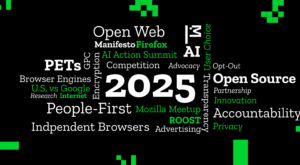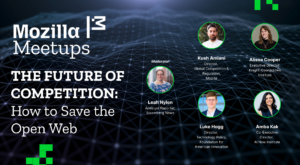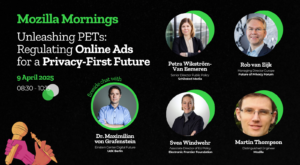Welcome to the blog series “Behind the Manifesto,” where we unpack core issues that are critical to Mozilla’s mission. The Mozilla Manifesto represents Mozilla’s commitment to advancing an open, global internet. This blog series digs deeper on our vision for the web and the people who use it, and how these goals are advanced in policymaking and technology.
The internet wasn’t always a set of corporate apps and walled gardens. In its early days, it was a place of experimentation — a digital commons where anyone could publish, connect, and build without asking permission. That openness depended on invisible layers of technology that allowed the web to function as a true public space. Layers such as browser engines, open standards, and shared protocols are the scaffolding that made the internet free, creative, and interoperable.
In 2013, there were five major browser engines. Now, only three remain: Apple’s WebKit, Google’s Blink, and Mozilla’s Gecko (which powers Firefox). In a world of giants, Gecko fights not for dominance, but for an internet that is open and accessible to all.
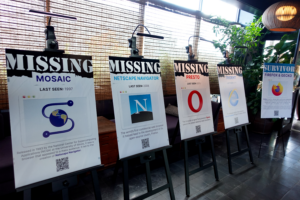 In an era of consolidation, a thriving and competitive browser engine ecosystem is critical. But sadly, browser engines are subject to the same trends towards concentration. As we’ve lost competitors, we lose more than a piece of code. We lose choice, perspectives, and ideas about how the web works.
In an era of consolidation, a thriving and competitive browser engine ecosystem is critical. But sadly, browser engines are subject to the same trends towards concentration. As we’ve lost competitors, we lose more than a piece of code. We lose choice, perspectives, and ideas about how the web works.
So, how do we drive competition in browser engines and more widely across the web? How do we promote policies that protect people and encourage meaningful choice? How do we contend with AI as both a disruptor and an impetus for innovation? Can competition interventions protect the open web? What’s the impact of landmark antitrust cases for consumers and the future technology landscape?
These aren’t new questions for Mozilla. They’re the same questions that have shaped our mission for more than 20 years, and the ones we continue to ask today. Our recent Mozilla Meetup in Washington D.C., a panel-style event and happy hour, brought these debates to the forefront.
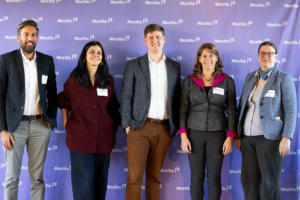 On October 8th, we convened leading minds in tech policy to explore the future of competition and its role in saving the open web. Before a standing-room-only audience, the panelists discussed browser competition, leading antitrust legislation, landmark cases currently under review, and AI’s impact. Their insights underscored a critical point: the same questions about access, agency and choice that defined parts of the early internet are just as pressing in today’s digital ecosystem, shaping our continued pursuit of an open and diverse web. Below are a few takeaways.
On October 8th, we convened leading minds in tech policy to explore the future of competition and its role in saving the open web. Before a standing-room-only audience, the panelists discussed browser competition, leading antitrust legislation, landmark cases currently under review, and AI’s impact. Their insights underscored a critical point: the same questions about access, agency and choice that defined parts of the early internet are just as pressing in today’s digital ecosystem, shaping our continued pursuit of an open and diverse web. Below are a few takeaways.
On today’s competition landscape:
Luke Hogg, Director, Technology Policy, Foundation for American Innovation:
“Antitrust is back. One of the emerging lessons of the last year in antitrust cases and competition policy is that with these big questions being answered, the results do tend to be bipartisan. Antitrust is a cross-partisan issue.”
On the United States v. Google LLC search case:
Kush Amlani, Director, Global Competition & Regulation, Mozilla:
“One of our key concerns was ensuring that search competition didn’t come at the expense of browser competition. And the payments to independent browsers were not banned, and that was obviously granted by the judge…What’s next is really how the remedies are implemented, and how effective they are. And the devil is going to be in the detail, in terms of how useful is this data? How much can third parties benefit from syndicating search results?”
Alissa Cooper, Executive Director, Knight-Georgetown Institute:
“The search case is set up as being pro-divestiture or anti-divestiture, but it’s really about what is going to work. Divestiture aligns with what was requested. If you leave Chrome under Google, you have to build in surveillance and monitoring in the market to make sure their behavior aligns. If you divest, it becomes independent and can operate on its own without the need for monitoring. In the end, do you think that would be an effective remedy to open the market to reentry? Or do you think there is another option?”
On the impact of AI:
Amba Kak, Co-Executive Director, AI Now Institute:
“AI has upended the market and changed technology, but it’s also true Big Tech, in many ways, has been training for this very disruption for the last ten years.
In the early 2010s, key resources — data, compute, talent — were already concentrated within a few players due to regulatory inaction. It’s important to understand that this trajectory of AI aligning with the incentives of Big Tech isn’t an accident, it’s by design.”
On the timing of this fight for the open web:
Alissa Cooper, Executive Director, Knight-Georgetown Institute:
“The difference now [as opposed to previous fights for the web] is that we have a lot of experience. We know what the open world and open web look like. In some ways, this is an advantage. The difference now is the unbelievable amount of corporate power involved. There needs to be a field where new businesses can enter. Without it, we are fighting the last war.”
This blog is part of a larger series. Be sure to follow Jenn Taylor Hodges on LinkedIn for further insights into Mozilla’s policy priorities.
